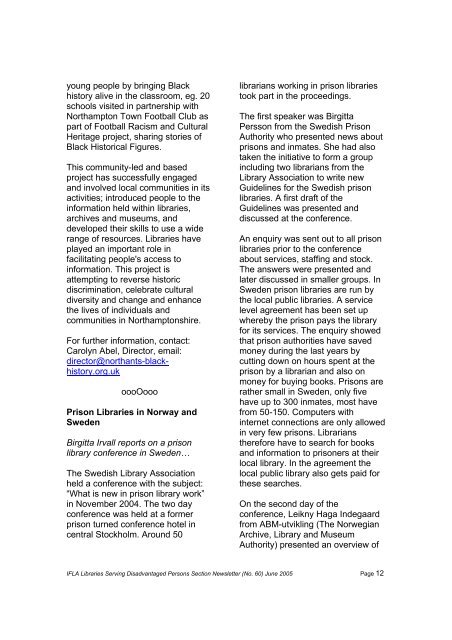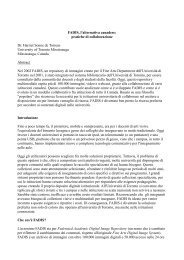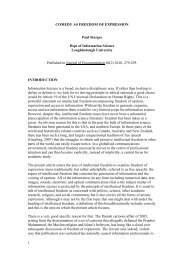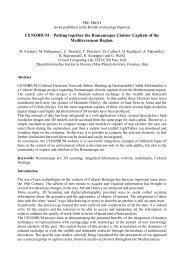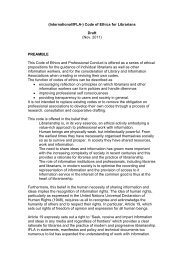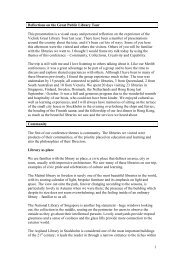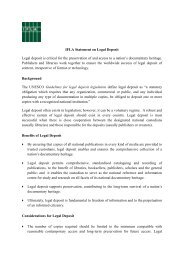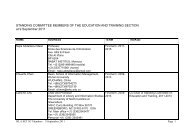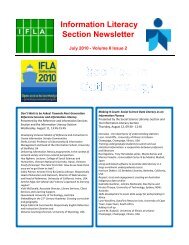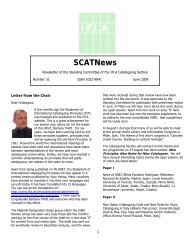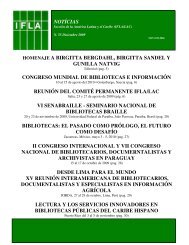IFLA Section Libraries Serving Disadvantaged Persons Section
IFLA Section Libraries Serving Disadvantaged Persons Section
IFLA Section Libraries Serving Disadvantaged Persons Section
You also want an ePaper? Increase the reach of your titles
YUMPU automatically turns print PDFs into web optimized ePapers that Google loves.
young people by bringing Black<br />
history alive in the classroom, eg. 20<br />
schools visited in partnership with<br />
Northampton Town Football Club as<br />
part of Football Racism and Cultural<br />
Heritage project, sharing stories of<br />
Black Historical Figures.<br />
This community-led and based<br />
project has successfully engaged<br />
and involved local communities in its<br />
activities; introduced people to the<br />
information held within libraries,<br />
archives and museums, and<br />
developed their skills to use a wide<br />
range of resources. <strong>Libraries</strong> have<br />
played an important role in<br />
facilitating people's access to<br />
information. This project is<br />
attempting to reverse historic<br />
discrimination, celebrate cultural<br />
diversity and change and enhance<br />
the lives of individuals and<br />
communities in Northamptonshire.<br />
For further information, contact:<br />
Carolyn Abel, Director, email:<br />
director@northants-blackhistory.org.uk<br />
oooOooo<br />
Prison <strong>Libraries</strong> in Norway and<br />
Sweden<br />
Birgitta Irvall reports on a prison<br />
library conference in Sweden…<br />
The Swedish Library Association<br />
held a conference with the subject:<br />
“What is new in prison library work”<br />
in November 2004. The two day<br />
conference was held at a former<br />
prison turned conference hotel in<br />
central Stockholm. Around 50<br />
librarians working in prison libraries<br />
took part in the proceedings.<br />
The first speaker was Birgitta<br />
Persson from the Swedish Prison<br />
Authority who presented news about<br />
prisons and inmates. She had also<br />
taken the initiative to form a group<br />
including two librarians from the<br />
Library Association to write new<br />
Guidelines for the Swedish prison<br />
libraries. A first draft of the<br />
Guidelines was presented and<br />
discussed at the conference.<br />
An enquiry was sent out to all prison<br />
libraries prior to the conference<br />
about services, staffing and stock.<br />
The answers were presented and<br />
later discussed in smaller groups. In<br />
Sweden prison libraries are run by<br />
the local public libraries. A service<br />
level agreement has been set up<br />
whereby the prison pays the library<br />
for its services. The enquiry showed<br />
that prison authorities have saved<br />
money during the last years by<br />
cutting down on hours spent at the<br />
prison by a librarian and also on<br />
money for buying books. Prisons are<br />
rather small in Sweden, only five<br />
have up to 300 inmates, most have<br />
from 50-150. Computers with<br />
internet connections are only allowed<br />
in very few prisons. Librarians<br />
therefore have to search for books<br />
and information to prisoners at their<br />
local library. In the agreement the<br />
local public library also gets paid for<br />
these searches.<br />
On the second day of the<br />
conference, Leikny Haga Indegaard<br />
from ABM-utvikling (The Norwegian<br />
Archive, Library and Museum<br />
Authority) presented an overview of<br />
<strong>IFLA</strong> <strong>Libraries</strong> <strong>Serving</strong> <strong>Disadvantaged</strong> <strong>Persons</strong> <strong>Section</strong> Newsletter (No. 60) June 2005 Page 12


